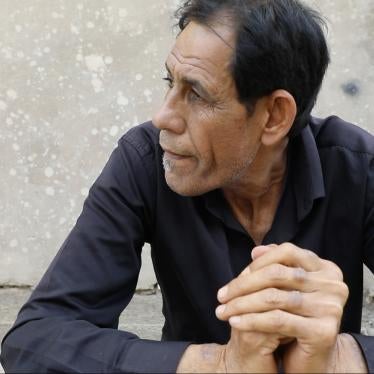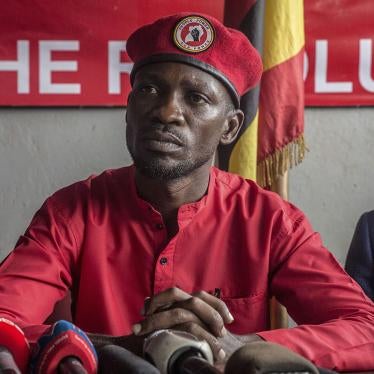(Guantanamo Bay, Cuba) — On September 11, 2001, I sat in my office in the Empire State Building, then New York City’s third tallest building, with a direct view of the two tallest, the twin towers of the World Trade Center. Shortly after the second jet crashed into them, I evacuated the building, aware that it might easily be targeted as well.
A neighbor, the father of three, died in the World Trade Center, and my city was traumatized. It was thus with a great personal interest that I looked forward to the alleged masterminds of this horrendous crime being brought to justice. But as I sat in the Guantánamo courtroom this weekend for the arraignment of the five leading suspects, I couldn’t help but feel cheated.
President Obama had the right idea in 2009 when his Justice Department sought and obtained grand-jury indictments against the five in federal court in southern Manhattan. Having worked as a prosecutor in that courthouse for four years before joining Human Rights Watch, I knew that even the toughest, most difficult cases could be handled there fairly and safely. However, after various objections to civilian trials were voiced, Obama soon reversed course and returned the case to a military commission in Guantánamo.
Some objected on security grounds to a trial in New York City — as if the city isn’t already a terrorist target, as if its courthouse hasn’t handled a long line of mafia dons, drug trafficking kingpins and even terrorists, with far less disruption than the annual Thanksgiving Day parade. Others wanted to continue the Bush-era insistence on treating Al Qaeda members as “warriors” rather than common criminals, despite the more elevated label that bestowed.
Many simply sought a more controlled, predictable environment than a civilian court. In federal court, the judge enjoys the independence of life tenure; the jury pool is chosen randomly from the community; and defense counsel operates without interference from the prosecution. But in the military commissions, a military official appoints the judge and picks the jury panel, and the defense cannot subpoena witnesses or access investigative resources without seeking the prosecutor’s permission first.
Military commissions also make it easier to introduce statements that are the product of coercive interrogation. Obama’s military commissions do bar statements that were the product of torture or inhumane treatment, but those aren’t the only types of statements that are inherently unreliable.
American civilian courts prohibit all involuntary statements — a basic rule of fairness — but the military commissions require statements to be voluntary only when made by the defendants, not when made by other witnesses. That’s a major (and unfair) advantage for the prosecution, leaving open the possibility of convicting a defendant and sending him to death on the basis of coerced witness statements. That the rules were deliberately written that way raises concern that such an awful possibility may be the government’s intent.
To help ensure that witness statements are voluntary, regular federal courts require most witnesses to testify personally in court. But the military commissions allow the prosecutor to introduce a witness’s statement through the testimony of someone else — that is, through hearsay. And that hearsay testimony can be introduced as a summary of an interrogation rather than a transcript — another way to cover up possible coercion.
As a result, the military commission prosecutor might “launder” coerced witness statements — by introducing a summary through an official who was not even present at an interrogation, has no knowledge of its circumstances, and thus cannot be effectively cross-examined about them. Indeed, a prosecutor presented with such summary testimony by the C.I.A. might not even know that it was coerced.
These military commissions may be “new and improved” from earlier versions, but they are still rigged against the defendants.
Their proponents think that military commissions are the tough way to combat terrorism, but they are really a gift to terrorist recruiters. If a conviction is tainted by unfairness and the defendants are railroaded to death, it would generate outrage. Most people would simply grind their teeth and move on, but a small number would be driven into the grasp of Al Qaeda and its successors. And, as we sadly know, it doesn’t take many angry people to launch a horrible terrorist act.








